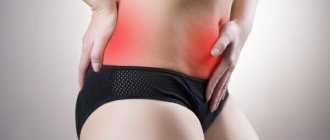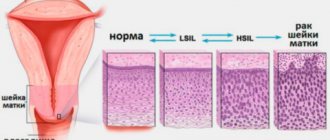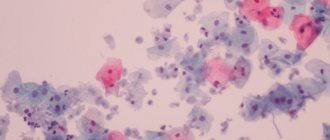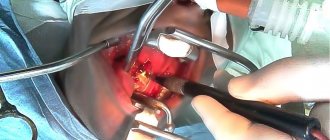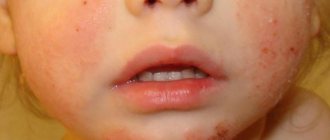Burning in the vagina is an unpleasant subjective sensation inside the vagina. It is often combined with itching sensations. The burning sensation in the vagina has practically no independent significance, since it can accompany a significant number of ailments, including those of non-gynecological origin, and also have physiological causes.
A large number of women experience unpleasant sensations in the form of burning, itching or discomfort in the genital area, regardless of the state of their gynecological health. Sometimes burning and/or itching in the vaginal area is the only reason to consult a gynecologist. In some cases, a burning sensation in the vagina appears and goes away on its own.
The vulva and vaginal area contains a large number of nerve endings that respond to mechanical, chemical, thermal and many other types of influences. The appearance of any of these factors can provoke a burning sensation in the vaginal and/or vulvar area.
A burning sensation in the genital area in most cases accompanies local inflammatory processes of various origins. The normal vaginal environment is characterized by constant acidity (pH), and its microflora is dominated by lactic acid bacteria (lactobacillus). Lactobacilli do not allow unwanted microflora to multiply and protect the vaginal mucosa from inflammation and infection. Changes in the composition of normal microflora lead to an excessive increase in the amount of opportunistic or pathogenic flora, and the resulting inflammation damages the vaginal mucosa, causing a feeling of burning, itching or discomfort.
The severity of the burning sensation varies from mild to severe. It can occur in children, adults and older women, appear periodically and last a short time or be permanent.
A burning sensation in the vagina during pregnancy or during menstruation is due to natural causes associated with hormonal changes.
Vaginal burning almost never occurs as the only symptom. It often appears against a background of various types of discharge and is accompanied by urination problems.
Therapy for burning sensation in the vagina begins after determining the cause of its occurrence. If the patient has a non-gynecological disease that can cause vaginal burning and itching, examination and treatment are carried out taking into account the recommendations of the therapist.
What causes burning in the genital area?
Vaginal burning can indicate many diseases and inflammatory processes. Among the most common reasons:
- dysbacteriosis (Dysbacteriosis) or vaginal vaginosis associated with the growth of opportunistic microflora. With a decrease in general or local immunity, the bacteria that make up the normal flora of the vagina cannot resist pathogenic bacteria, which leads to the proliferation of Candida fungi, Gardnerella, and E. coli. This also happens during menstruation or after treatment with antibiotics. In such situations, the doctor usually prescribes local antiseptic and anti-inflammatory drugs, as well as drugs that improve the condition of the microflora;
- sexually transmitted infections: chlamydia, trichomoniasis (Trichmonosis, trichomoniasis), gonorrhea (Gonorrhoea), papillomavirus infection, herpes (Herpesviridae). One of the main signs of these diseases is burning in the vagina, itching, and skin problems. Treatment is prescribed depending on the nature of the pathogen and the individual characteristics of the patient’s body. As a rule, antibiotics are present in this course;
Why does a burning sensation occur in the vagina? - allergy on the chemical composition of the care product or contraception. An allergic reaction can occur due to the use of inappropriate soap for intimate hygiene, scented sanitary pads, or intimate deodorants.
During the period of vaginal burning, you should avoid these products and do not use colored toilet paper.Many women are allergic to latex, lubricants, suppositories and sprays. In such cases, it is enough to discover the “culprit”, and after stopping its use, the burning sensation weakens and soon goes away completely;
Expert opinion
Practice shows that a fairly high percentage of patients in gynecological offices have little idea of what the composition of intimate hygiene products, pads and lubricants should be. In this regard, one should not underestimate the importance of educational conversations with women on the topic of mistakes in intimate hygiene and the resulting burning sensation in the vagina, which can be carried out in antenatal clinics and gynecology departments.
Obstetrician-gynecologist of the highest category Oksana Anatolyevna Gartleb
- changes in hormonal levels
due to pregnancy, puberty, menopause, stress. They can provoke a decrease in estrogen production, which causes loss of the stratum corneum layer, decreased secretion, and increased irritability. In this situation, medications that regulate the production of hormones are used to treat burning sensation in the vagina. To moisturize the vaginal walls, patients are prescribed special lubricants and gels;
- inflammation of the genitourinary system (adnexitis, cystitis (Cyctitis), endometritis (Endometritis), metritis (Metritis), cervicitis (Cervicitis), in which secretions from the organs flow onto the walls of the vagina, causing a burning sensation. A comprehensive examination will help identify infections and choose the right drug.
Treatment of burning sensation in the vagina
Folk remedies to protect women's health
Folk recipes based on plant extracts have the most smoky effect. They usually have antibacterial and regenerative properties.
- Two teaspoons of nettle, chamomile or calendula should be poured into 500 grams of boiling water and left for 2 hours. The resulting herbal infusion is used for douching at night; the course consists of 5-7 procedures.
- If the itching becomes unbearable, take about 5 grams of fir oil and heat cocoa butter (20-25 grams) in a water bath until boiling and cool. A tampon or tightly rolled gauze is soaked in the resulting mixture and placed in the vagina overnight. You should first douche with water and baking soda.
- Prepare a decoction of the taken herbs in equal proportions: hops (cones), St. John's wort, birch, calendula, string, chicory. The mixture is poured with boiling water, infused and consumed orally at 180-200 grams half an hour before meals.
How to cure burning sensation?
- if the burning sensation does not go away for more than three days, you should contact a gynecologist who will conduct an examination and take tests for infections. Based on them, you can begin treatment or conduct further examination;
- To reduce vaginal burning and get rid of discomfort, abstain from sexual intercourse, take baths with salt, ask your doctor to prescribe a topical cream or gel. To combat itching and burning of the vagina, the Gynocomfort Restoring Gel is well suited. Developed by specialists from the pharmaceutical company VERTEX and undergoing clinical trials, it has proven itself well among women and gynecologists. The product was tested at the Department of Dermatovenereology with the clinic of St. Petersburg State Medical University under the leadership of Ignatovsky A.V. and Sokolovsky E.V. In the course of clinical studies, it was found that Ginocomfort Restoring Gel demonstrates good effectiveness when used as part of complex therapy for candidiasis and bacterial vaginosis.
- temporarily exclude foods containing yeast from your diet: bread, pizza, marinades, fruit juices, grapes, wine vinegar, mushrooms, smoked fish and meat, buns and croissants, beer and wine.
Eat more foods with lactic acid bacteria.
Why does there be irritation in the intimate area after hair removal?
To prevent burning, do not forget about regular intimate hygiene, take care to increase your immunity, and avoid stress and heavy exertion.
Preventive actions
To prevent the disease, so that it does not return and cannot in any way ruin the life of a healthy woman, it is important to observe prevention.
Experts recommend to their patients the simplest methods available to everyone as prevention. They must be observed daily, taking into account the nature of the diseases.
Many women do not think about the consequences of developing the disease and ignore advice, which does not end very well for them. After severe pain has subsided, girls often forget about taking preventive measures.
It is necessary to follow a few simple recommendations that will help avoid unpleasant symptoms:
- use dry soap less often; special intimate hygiene products containing an acidic environment are best;
- replace condoms with another contraception, use them as needed;
- use vaginal lubricants less often, and it is best to abandon them for a while;
- Instead of synthetic panties, it is best to wear cotton underwear;
- do not engage in special diets; a woman’s diet must contain all the necessary microelements;
- It is recommended to introduce fermented milk products into the diet and reduce sugar;
- for the first time, refuse to have sex;
- Do not use panty liners; it is better to avoid them during treatment.
Burning and itching of intimate areas, video
Obstetrician, gynecologist Popelnitskaya Natalya Olegovna about burning in the intimate area in women.
Source - KVD - dermatovenerological dispensary Sources:
- THERAPY OF UROGENITAL DISORDERS CAUSED BY ESTROGEN DEFICIENCY. Serov V.N. // // Obstetrics, gynecology and reproduction. – 2010. – No. 1. – P. 21-35.
- MODERN PRINCIPLES OF DIAGNOSIS AND TREATMENT OF VAGINAL CANDIDIASIS. Evseev A.A. // Bulletin of reproductive health. – 2009. – June. – pp. 20-24.
- Vaginal atrophy in menopause. Balan V.E. // Effective pharmacotherapy in obstetrics and gynecology. - 2009. - 3 - P. 44-47.
- Clinical picture, diagnosis and treatment of vaginal atrophy in menopause. Balan V.E. // Gynecology. - 2009. - 2(11). — P. 26-29.
- The effect of hormone replacement therapy on arterial hypertension in the treatment of menopausal syndrome in women after panhysterectomy. Brozhenko V.V. // Author's abstract. dis. Ph.D. honey. Sci. – 2001. – P. 24.
- https://www.medicalnewstoday.com/
- https://www.healthline.com/health/womens-health/vaginal-burning
- https://www.webmd.com/women/guide/vaginal-itching-burning-irritation#1
- https://www.healthhype.com/itchy-vagina-causes-of-itching-and-burning-discharge-odor.html
What examinations will be carried out
As noted above, there are many reasons that can provoke itching, burning and other unpleasant sensations in the vaginal area. They are extremely diverse and require different approaches to treatment. Only a specialist can accurately determine the nature of the discomfort after conducting the necessary examination.
The doctor will conduct a survey of the patient, an examination and colposcopy, and will also determine what tests should be taken. Most often we are talking about a smear to determine flora using PCR, bacteriological culture, ultrasound of the pelvic organs, analysis for intestinal dysbiosis, the presence of parasites, etc. Which of these tests should be taken in each specific case, the doctor will decide directly during the appointment.
Popular questions
I have burning and itching of the genitals, please tell me what can be done.
At this stage, you can use Gynocomfort gel with tea tree oil, which will have an anti-inflammatory effect and eliminate swelling and burning. And then you need to contact an obstetrician-gynecologist for an examination to identify the cause of the disease.
I have been concerned about itching and burning in the vaginal area for 5 days now. Painful sensations began when urinating. What could this be and how to eliminate it?
You describe the signs of vulvovaginitis and incipient ascending urethritis. This requires contacting an obstetrician-gynecologist, and if the disease progresses, a urologist to conduct an examination to identify the infectious agent and prescribe complex treatment.
Day 3: burning sensation after going to the toilet. White-yellow discharge.
Hello! I recommend using Gynocomfort restoring gel, 1 dose once a day for 5 - 7 days. If you do not notice any improvement, then consult a urologist for examination and adjustment of therapy.
When applying Gynocomfort there is a strong burning sensation.
Hello!
If the burning sensation does not last long and stops a few minutes after administration, then you can continue using the product. For an accurate diagnosis, contact a specialist
Clinical manifestations
The vulva contains numerous nerve receptors that respond to any irritating factors of a thermal, chemical or physical nature. The irritant or prolonged effect of any such factor can cause discomfort and pain in a woman.
Burning of the internal genital organs causes constant discomfort, disrupts sexual life, can cause difficulty falling asleep and, as a result, loss of strength and deterioration of the psycho-emotional background.
This sensation in the vagina almost never appears alone as a symptom. Most often, this phenomenon is combined with accompanying symptoms, which depend on the nature of the disease.
In most cases, these signs are:
- leukorrhea (excessive vaginal discharge);
- unpleasant odor of discharge;
- soreness of other genital organs (clitoris, labia, breasts);
- dysuria (impaired urination);
- pain when urine flows out;
- dyspareunia (pain during sex);
- swelling of the vulvar mucosa;
- bloody or purulent discharge from the genital tract.
The intensity of the burning varies significantly: from barely noticeable to severe, bordering on acute pain. It can occur at any age, from infants to old women.
Treatment
Therapy depends on what caused the vaginal itching. If you have ruled out external factors (allergies, hypothermia, stress), then the doctor prescribes treatment - make an appointment with him.
Home treatment
But if you can’t urgently visit a specialist, you can help yourself. To do this, daily intimate hygiene with the use of antiseptics (for example, furatsilin solution) is recommended. You will also have to give up allergenic foods and give preference to fermented milk foods. A compress will help relieve the itching a little: take 50 g of cocoa butter and add 5 g of fir butter to it. Heat the mass to body temperature, then apply it to a gauze swab and insert it into the vagina. The compress should be kept in place all night and removed in the morning.
If you wear synthetic underwear, then replace it with natural, breathable ones. Protect yourself from excessive physical exertion and try to maintain sexual rest. All these simple ways will make waiting for a visit to the doctor easier.
Drug treatment
Therapy is selected according to the diagnosis.
- Candidiasis - effective antifungal agents with clotrimazole are taken. If desired, the vagina is treated with hydrogen peroxide or chlorhexidine. After treatment, vitamins, immunostimulating agents and anti-dysbacteriosis drugs are prescribed, which improve the vaginal microflora.
- Bacterial infections are treated with medicinal suppositories or vaginal tablets.
- For cervicitis, complex treatment is prescribed - broad-spectrum antibiotics and antiviral drugs. In addition, it is recommended to take local medications such as Terzhinan.
- To get rid of genital herpes, Acyclovir and similar antiviral drugs are prescribed. The duration of therapy depends on the advanced stage of the disease - you should not delay treatment, since advanced forms are difficult to cure.
- If the cause of vaginal itching is an STD, then complex therapy is required. It involves taking appropriate antibiotics, immunity-boosting medications, and vitamins. It is impossible to get rid of such diseases with local drugs.
In some cases, treatment is carried out jointly with other specialists: an allergist, venereologist, endocrinologist, immunologist, psychotherapist. It is possible to prescribe physiotherapy, hormonal correction, sedatives, etc. Incorrect treatment or its absence leads to advanced forms of the disease and the addition of other infections. This makes diagnosis very difficult and prevents you from choosing the right course of treatment.
The causes of vaginal itching are discussed in this video.

